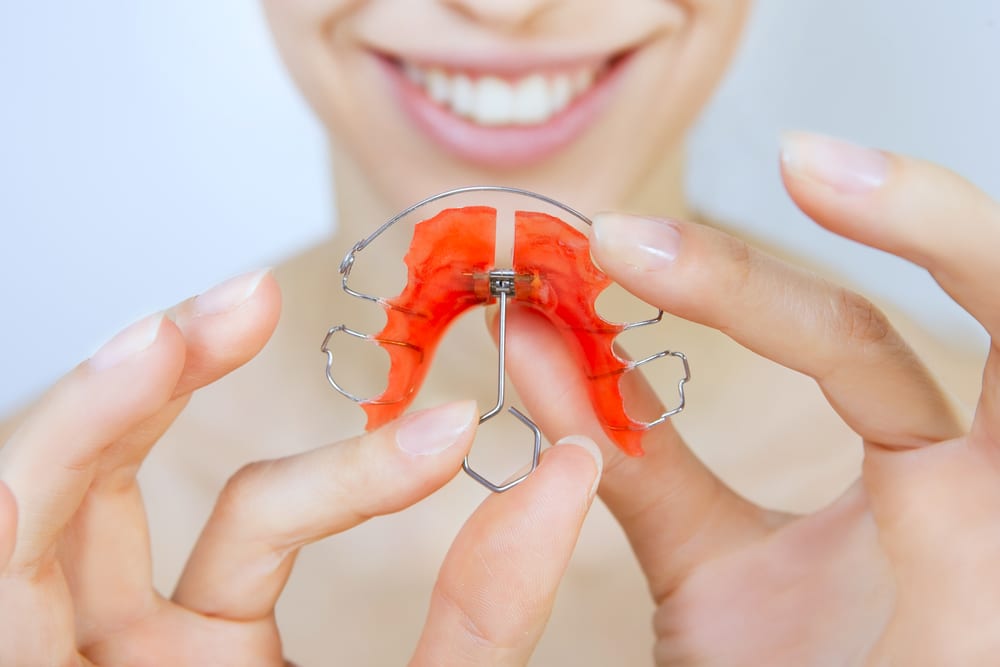Your newly straight, clean teeth absolutely need a clean retainer on a daily basis, so here are our tips to take care of your retainer!

All of us at JK Orthodontics want each our patients and parents to fully understand just how essential it is to keep retainers clean on a daily basis. Your retainer truly is the added insurance on your orthodontic treatment, and wearing it as recommended by Dr. Karpac will fully ensure that your treatment results will in fact last for the rest of your life!
Brushing and thoroughly cleaning your retainer really is just as important as brushing your teeth. The hard truth that everyone must face is that retainers tend to harbor very serious forms of bacteria on them, and nobody wants the funky smells or tastes of a dirty retainer in their mouth!
Below we’ll be going over the different types of retainers available to you after you’ve completed your orthodontic treatment with Dr. Karpac, and we’ll also be detailing some cleaning tips to keep in mind as well.
Most Common Types of Retainers
Today’s orthodontic industry has evolved a lot when it comes to the overall functionality and comfort of retainers, which goes a long way in better ensuring that teenagers and younger patients feel more inclined to wear and take care of their retainers.
The two common types of retainers that you’ll obtain from JK Orthodontics include the following:
- Metal and acrylic retainers (also referred to as a Hawley retainer)
- Clear plastic retainers (your final Line-M-Up™ invisible aligner tray)
Dr. Karpac can support you or your child with both of these retainer options and let you know which option would work best for your unique needs. But for right now, let’s hone in on how you’ll end up keeping your retainers clean!
Properly Cleaning Your Hawley or Invisible Aligner Retainer
The good news about cleaning both types of retainers is that it’s pretty much the same procedure, and it’s always pretty easy to do on a daily basis. The most important thing for patients to remember is that they should always thoroughly clean their retainer when they’re brushing their teeth and doing other types of oral health upkeep.
Tips For Cleaning Your Retainers:
Although retainer cleaning tips could go on and on, we’ve narrowed down the most important tips you should keep in mind below:
- It’s important to utilize a soft bristle toothbrush that’s specifically for cleaning your retainer. You’re not going to need toothpaste for this brushing and just water is fine, and this is largely because toothpaste obtains certain abrasives that can scratch your retainer. Retainer scratches are never good because they end up being the perfect place for bacteria to develop.
- Be sure to not scrub too hard when you’re brushing your retainer. Even your soft bristle brush can end up scratching the retainer’s surface, which would result in similar issues like toothpaste.
- Always thoroughly brush your retainer on all surfaces and sides. It’s important to remember that your retainer is always going to be in your mouth for several hours a time (generally when you’re asleep), so making sure that it’s completely brushed is very important.
- Soaking your retainer in a denture cleaner or other recommended cleaning solution will help kill germs and freshen it up. What’s important to keep in mind here is that soaking doesn’t replace brushing, but it is a good additional cleaning method to ensure extra cleanliness. You also shouldn’t soak your retainer too often, but a weekly basis should do the trick!
- You should always follow the instructions when you’re soaking your retainer in a denture cleaner. Once your retainer has been thoroughly soaked, you’ll need to brush it really well and then rinse it with warm water to ensure that you’ve gotten rid of all the cleaning solution.
- You can also soak your retainer in mouthwash to effectively kill bacteria and remove unwanted odors. When you go this route, it’s best to create a solution that includes equal amounts of lukewarm water and mouthwash. You should also make sure that you’re only keeping your retainer in this type of solution for about an hour at a time. You’ll also still need to brush and rinse after using mouthwash as your retainer soaking solution.
- It’s very important that you only utilize non-alcoholic mouthwash for retainer soaking. Mouthwashes that include alcohol can many times damage the plastic of your retainer, which can be detrimental for its overall functionality.
- You’re also going to need to continuously clean your retainer case as well! Frequently scrubbing your case with warm, soapy water is always good for the overall cleanliness of your case. Just be sure that you rinse the case off and let it dry each time that you clean it!
Keeping Your Retainer Clean Is Always Very Important!
After going through the financial and time investment associated with orthodontic treatment, you’ll undoubtedly want your treatment results to last for the rest of your life. Properly cleaning (and using) your retainer as recommended by Dr. Karpac will go a very long way towards ensuring that your teeth remain as clean and as beautiful as possible.
Contact us online or call us at 614-766-0330 (Dublin office) or 614-471-6355 (Gahanna office) to ask us any questions you have about retainer upkeep today!

